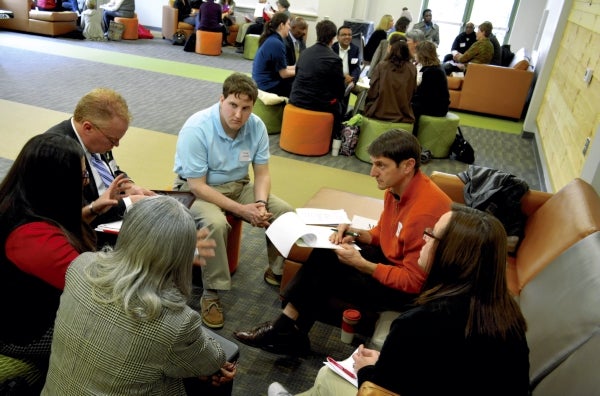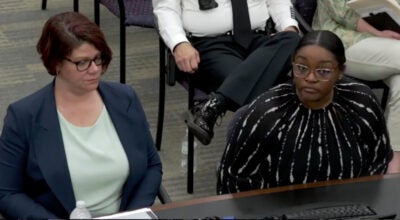Community forum aims to improve Rowan residents’ health
Published 12:10 am Saturday, February 13, 2016

- Jordan Honbarger, center, and Richard Reinholz, right, participate in small group discussions during the community health forum. Photo by Susan Shinn, for the Salisbury Post.
By Susan Shinn
For the Salisbury Post
Building relationships and connecting the dots are the key to improving the health of a community.
That was the conclusion of more than 125 people who attended a community health forum Friday in the Faith Center of St. John’s Lutheran Church. The half-day event included healthcare professionals, pastors, and members of social services agencies and nonprofit organizations.
Keynote speaker Dr. Soma Stout of Boston is a founder of “100 Million Healthier Lives,” a global initiative that seeks to achieve improvement of community and population health.
Before her presentation, Dari Caldwell, president and CEO of Novant Health Rowan Medical Center, and Nina Oliver, director of the Rowan County Health Department, shared sobering statistics. They served on the event’s steering committee, which also included Mayor Karen Alexander, County Commissioner Judy Klusman and Carolyn Byrd, St. John’s director of senior adult ministry. Krista Woolly, executive director of Community Care Clinic, chaired the committee.
The most distressing news: Rowan County ranks 76th out of North Carolina’s 100 counties on health rankings.
Stout’s initiative seeks to change statistics like these in three ways: unprecedented collaboration, innovative improvement and system transformation. Her hope is that such changes will result in 100 million people living healthier lives by 2020.
Such an ambitious plan hinges on comprehensive collaboration, Stout said.
“How many people’s lives could you improve if you worked together across sectors?” she asked.
All communities who seek to improve their citizens’ health, she noted, have shared priorities. These include closing equity gaps, helping veterans thrive, helping all children have a great start to life, encouraging citizens to engage in improving their health, and creating well being for seniors.
Stout asked attendees to consider five questions:
• Whose life will get better because we were here?
• What can we do to facilitate real transformation in the health and well being of people, systems and communities?
• How can we partner with each other and with people with life experience in a way that builds a community of solutions?
• Who isn’t thriving in our community, and what would it take for that to change?
• How can we change the system?
Following a presentation from the Rev. Richard Joyner of Conetoe (see sidebar), the group broke into small groups to discuss these questions.
The Rev. Danielle Kosanovich DeNise, St. John’s pastor for discipleship, said the faith-based community has a role to play in improving health.
“In Jeremiah, God talks about plans to you give hope and a future,” she said. “That’s where the church comes in. We want you to know that you have hope, and you have a future.”
Nicklaus Goodman, a Community Care Clinic board member, said agencies need to spend less time worrying about themselves and more time worrying about the people they’ve serving, working together to expand resources and prevent overlap of services. It doesn’t matter which agency serves someone, he said, as long as they get served.
The Rev. Chris Shelton, senior pastor of Life Church, is also on the clinic’s board. He, too, believes that faith-based partnerships are critical.
“The problem is that many of our faith-based organizations are doing a lot of really good work, but we’re not doing a lot of talking and collaborating,” he said.
Anne Corriher is executive director of Main Street Mission in China Grove.
“I wanted to know more, and be more connected to Salisbury,” she said. “We all work on the same problem and we’re all in the same county.”
Main Street Mission is one local agency offering the Bridges Out of Poverty program.
“It’s a holistic approach, and that’s what we need,” she said.
Woolly was encouraged by the participants’ high level of engagement.
“The hard work begins tomorrow,” she said.
Woolly and her committee will compile the results of the information shared by the small-group facilitators. Then they will develop a plan to move forward.
“We need to be open with results from other counties that have been successful versus reinventing the wheel,” said Richard Reinholz, the Hurley Y’s executive director.
Or, as Jordan Honbarger put it, “You can change the fish, or you can change the lake.”
Honbarger is a graduate student in UNCC’s School of Social Work, and an intern at Hanford-Dole Elementary School.
“It was so good to see this collaboration,” he said. “That’s how we’re going to change these outcomes, by working together.”
“I was shocked to learn that Rowan’s health numbers were not as good as any of the counties contiguous to us,” said Paul Fisher, F&M Bank’s chairman emeritus. “Companies looking for new locations might think twice about coming to Rowan County. Like it or not, poor personal health and our future economy are connected. We must begin to deal with the findings we learned about today.”
Freelance writer Susan Shinn lives in Salisbury.



